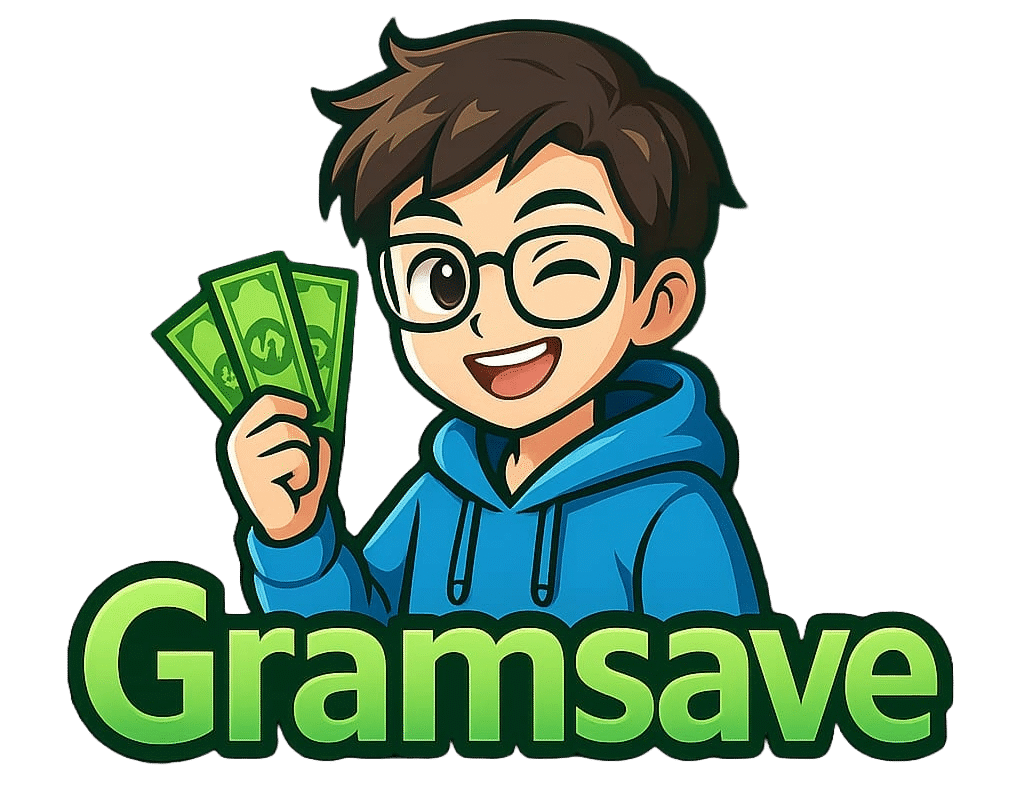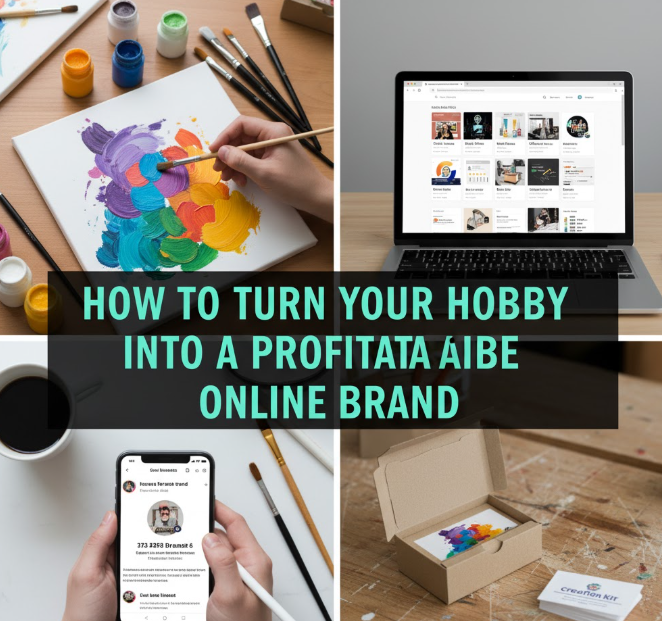Transforming Passion into Profit Has Never Been Easier — Here’s How You Can Do It Too!
Introduction: From Weekend Hobby to Online Income Stream
Have you ever thought, “I love doing this — if only I could make money from it”?
That’s how thousands of successful online entrepreneurs began. Whether it’s painting, baking, photography, gaming, gardening, or crafting — the internet gives you the power to turn what you love doing into a profitable online brand.
Thanks to social media, e-commerce platforms, and digital marketing tools, building a brand from your hobby isn’t just a dream anymore — it’s a real, achievable path. All you need is the right strategy, consistency, and creativity.
In this detailed guide, we’ll walk step-by-step through how to transform your hobby into a thriving online brand that earns you money — and gives you the freedom to do what you love every day.
Step 1: Discover What Makes Your Hobby Marketable
The first step in turning your passion into profit is identifying what people are willing to pay for. Not every hobby can become a full business, but almost any hobby can generate income if positioned correctly.
Ask Yourself These Questions:
-
Does my hobby solve a problem or make life easier/fun for others?
-
Are people already paying for similar products or services?
-
Do I enjoy doing this long-term, not just as a pastime?
-
Can I teach, sell, or entertain others through it?
Examples of Hobbies That Can Turn Profitable
| Hobby | Possible Monetization Paths |
|---|---|
| Photography | Sell prints, stock photos, online courses, or start a YouTube channel |
| Gardening | Create tutorials, sell organic seeds, or start a plant store |
| Fitness | Offer online coaching, eBooks, or branded workout gear |
| Art & Craft | Sell handmade products or digital designs on Etsy |
| Cooking | Start a food blog, YouTube channel, or sell recipe eBooks |
Pro Tip:
Use Google Trends or Etsy search to see what’s trending in your niche. For example, if you paint, check if “custom pet portraits” or “digital wall art” is gaining popularity — that’s your starting point!
Step 2: Find Your Niche and Target Audience
Every successful online brand has one thing in common — they know exactly who they’re talking to.
How to Identify Your Niche
-
List what you love doing: Be specific. Instead of “art,” go for “minimalist watercolor art.”
-
Study the competition: Look at how others are selling in your hobby category. What’s missing that you can add?
-
Spot the gap: Maybe people love a specific style, but no one offers it locally or at your skill level.
Defining Your Target Audience
Ask:
-
Who would love or benefit from what I create?
-
What age, gender, or interest group do they belong to?
-
Where do they hang out online — Instagram, Pinterest, TikTok, Reddit?
Example:
If your hobby is knitting, your audience might be “women aged 25–45 who love handmade fashion and sustainable clothing.”
Once you know this, your entire content and branding can be tailored for them.
Step 3: Build a Personal Brand That Stands Out
You’re not just selling products — you’re selling a story and experience. That’s where branding comes in.
Elements of a Strong Personal Brand
-
Brand Name: Keep it simple, memorable, and relevant. Example: CraftyCorner, FitByElla, BloomAndGrow.
-
Logo and Visual Identity: Choose colors and fonts that reflect your hobby’s vibe — warm tones for baking, bold for fitness, pastel for crafts.
-
Brand Story: Tell people why you started. Authentic stories attract followers.
-
Voice and Personality: Decide how you’ll talk to your audience — friendly, professional, funny, or inspiring?
Visual Branding Inspiration (Infographic Idea)
Step 4: Build Your Online Presence
You need a digital home where people can find you and your work.
Create a Professional Website
Even a simple website with your portfolio, story, and contact form gives you credibility.
Must-Have Pages:
-
Home: Who you are and what you offer.
-
About: Share your passion journey.
-
Shop/Portfolio: Showcase your work or services.
-
Blog/Resources: Share helpful tips to attract visitors.
-
Contact: Make it easy for fans or clients to reach you.
Tip:
Use platforms like Wix, Shopify, or WordPress — no coding required!
Leverage Social Media
Different hobbies perform better on different platforms:
| Platform | Best For |
|---|---|
| Visual hobbies (art, fashion, food, photography) | |
| YouTube | Tutorials, entertainment, storytelling |
| Crafts, decor, fashion, recipes | |
| TikTok | Quick demos, behind-the-scenes, lifestyle |
| Professional services like writing or coaching |
Be consistent — post 3–5 times a week, use niche hashtags, and engage with followers through stories, polls, and comments.
Step 5: Create Valuable and Engaging Content
To build trust and attract followers, content is your currency.
When people see your passion and expertise, they’re more likely to buy from you.
Types of Content You Can Create
-
Tutorials: “How I create handmade candles in 5 steps.”
-
Behind the Scenes: Show your workspace or creative process.
-
Tips and Tricks: Quick guides related to your hobby.
-
Product Demonstrations: Show how your creation is used.
-
Personal Stories: Share wins, struggles, and milestones.
Content Plan Example
| Day | Content Type | Goal |
|---|---|---|
| Monday | Tutorial post | Teach & build authority |
| Wednesday | Behind-the-scenes reel | Build connection |
| Friday | Product showcase | Drive sales |
| Sunday | Inspirational story | Build brand loyalty |
Pro Tip:
Use storytelling. Instead of “I sell handmade soaps,” say,
“I started making soaps because my skin reacted to chemicals — now I help others go chemical-free too.”
This turns simple content into emotional marketing.
Step 6: Monetize Your Hobby
Now the fun part — making money doing what you love!
There are multiple ways to monetize your online brand, depending on your hobby and audience.
1. Sell Physical or Digital Products
-
Handmade items (crafts, art, jewelry)
-
Merchandise (shirts, mugs, tote bags)
-
Digital goods (eBooks, templates, designs)
-
Prints or downloadable art
Platforms to Sell:
-
Etsy
-
Shopify
-
Gumroad
-
Amazon Handmade
2. Offer Services
-
Coaching or consulting
-
Freelance work (writing, photography, design)
-
Personalized creations
3. Create Online Courses or Tutorials
If your hobby involves teachable skills — like painting, guitar, fitness, or photography — share your expertise on:
-
Udemy
-
Skillshare
-
Teachable
4. Earn Through Content Monetization
Once you have an audience:
-
YouTube ads
-
Sponsored posts
-
Affiliate marketing
-
Patreon memberships
Income Potential Chart
| Monetization Type | Example | Average Monthly Income Range |
|---|---|---|
| Product Sales | Etsy shop for handmade candles | $300 – $5,000 |
| Online Courses | Skillshare painting class | $500 – $3,000 |
| YouTube Channel | Ad revenue + sponsors | $100 – $10,000+ |
| Affiliate Marketing | Product recommendations | $100 – $2,000 |
Remember:
Start small. You can begin with one or two methods and expand later.
Step 7: Build an Email List and Community
Social media followers are great, but your email list is your true asset — you own it.
Why Build an Email List?
-
You can directly promote your products and offers.
-
You build stronger relationships with loyal fans.
-
You’re not at risk if social media algorithms change.
How to Grow Your List
-
Offer a freebie (e.g., “Free 5-step guide to starting digital art”).
-
Add signup forms to your website and blog.
-
Send weekly or biweekly newsletters with updates, discounts, and stories.
Tool Suggestions: Mailchimp, ConvertKit, or Sendinblue.
Bonus Idea:
Create a small online community on Facebook or Discord for your most engaged followers. This builds brand loyalty and word-of-mouth marketing.
Step 8: Learn Basic Online Marketing
No matter how great your hobby is — people must find it.
SEO (Search Engine Optimization)
-
Use relevant keywords in titles, blogs, and product descriptions.
-
Add alt text to images.
-
Write helpful, long-form blog posts related to your niche.
Example:
If your hobby is “DIY candle making,” use keywords like:
-
“Homemade candle business tips”
-
“Best candle wax for beginners”
-
“How to sell handmade candles online”
Social Media Ads
Run small ad campaigns on Facebook or Instagram to reach new people.
Collaborations and Influencer Marketing
Partner with others in your niche for giveaways, shoutouts, or co-branded content.
Step 9: Stay Consistent and Keep Improving
Every online brand takes time to grow. The key is consistency — not perfection.
Growth Tips:
-
Track analytics on social media and your website.
-
Double down on what’s working — drop what’s not.
-
Keep learning — take free online courses on marketing and branding.
-
Celebrate milestones — your first sale, first 1,000 followers, etc.
Motivational Reminder:
Every successful online entrepreneur started small. The difference is — they didn’t give up when results were slow.
Step 10: Scale Your Brand for Long-Term Success
Once you start earning steady income, it’s time to scale your brand like a business.
Ways to Grow:
-
Hire Help: Outsource tasks like packaging, editing, or customer service.
-
Launch New Products: Keep your offerings fresh.
-
Collaborate with Other Brands: Joint collections or bundles can boost reach.
-
Automate Your Workflow: Use tools for scheduling, emails, and accounting.
-
Diversify Income: Add courses, digital products, or brand deals.
Example Growth Roadmap
| Stage | Monthly Income | Focus Area |
|---|---|---|
| Beginner | $0 – $500 | Build audience, learn marketing |
| Intermediate | $500 – $2,000 | Launch products, grow mailing list |
| Advanced | $2,000 – $10,000+ | Scale, collaborate, expand team |
Common Mistakes to Avoid
-
Trying to please everyone: Focus on your niche audience.
-
Neglecting branding: A strong visual identity builds trust.
-
Ignoring analytics: Data tells you what’s working.
-
Inconsistent posting: Momentum matters online.
-
Fear of selling: Remember — you’re offering value, not begging for money.
Real-Life Success Stories (Inspiration Corner)
| Name | Hobby | How They Monetized | Outcome |
|---|---|---|---|
| Emma Haruka | Baking | Started Instagram bakery; now sells courses | Earns $8,000/month |
| Lucas D. | Photography | YouTube tutorials + presets | Built 500k subscribers |
| Sara K. | Gardening | Blog + affiliate products | Full-time income from home |
Each began as a hobbyist — now, they run personal brands impacting thousands.
Conclusion: Your Hobby Could Be Your Future Career
Turning your hobby into a profitable online brand is about passion, patience, and purpose.
The world today rewards creativity — if you’re authentic and consistent, your unique skill can attract not only followers but paying customers.
So whether you love painting, writing, baking, gaming, or crafting — start today. Create your first post, open your first shop, share your first story. Every brand you admire started with one small, brave step — and yours can too.
Quick Recap Table
| Step | Key Action | Goal |
|---|---|---|
| 1 | Evaluate hobby potential | Find market opportunity |
| 2 | Define niche & audience | Focus marketing |
| 3 | Build brand identity | Stand out visually |
| 4 | Create online presence | Be discoverable |
| 5 | Produce content | Build trust |
| 6 | Monetize | Earn from passion |
| 7 | Grow email list | Build loyal community |
| 8 | Market your brand | Reach new audiences |
| 9 | Stay consistent | Ensure growth |
| 10 | Scale & expand | Achieve long-term success |
Final Thought
“Your hobby is the seed — your brand is the tree. Nurture it with passion, patience, and purpose, and soon it’ll bear the fruit of success.”

